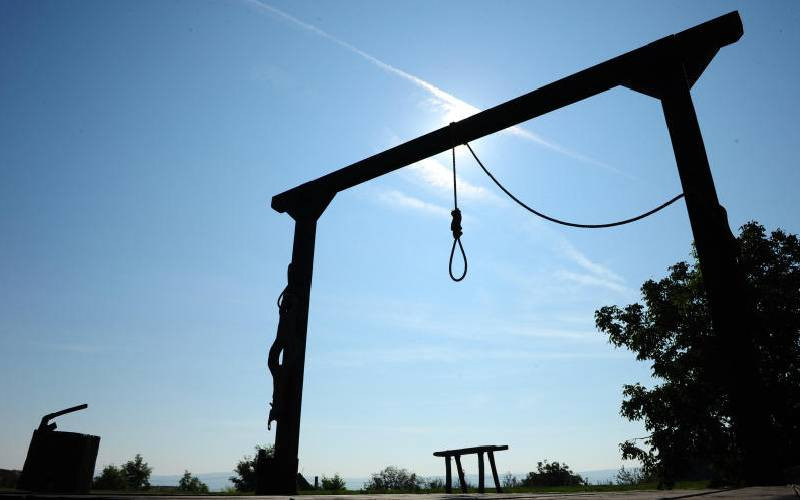 |
|
This is how Peter Gatiku Kariuki, 55, with his lawyer John Swaka (right), reacted after he was acquitted of robbery with violence charges by the Court of Appeal Monday. [Photo: Fidelis Kabunyi/Standard] |
After spending the last 10 years in Kamiti Maximum Prison, Peter Gatiku Kariuki, a death row convict, is now a free man. The 55-year-old father of six was acquitted by the Court of Appeal Monday.
Mr Gatiku could not believe his ears when justices GBM Kariuki, John Mwera and Agnes Murgor quashed the death sentence and allowed the appeal. The judges faulted both the trial court and the High Court for their decisions.
"It is patent that the trial court and the appellate court below did not properly evaluate the evidence and as a result, did not appreciate the danger of basing the conviction on the evidence of a single identifying witness and lack of cogency in that evidence, which clearly shows there was a possibility of an error," they ruled in a judgment read by Justice Kariuki.
The judges said the Court of Appeal had established that the robbery with violence charge Gatiku faced was not proved beyond reasonable doubt.
According to court records, Gatiku was to go to the gallows for allegedly stealing a mobile phone worth Sh4,700 from Mathew Kipkemboi at a bus stop in Ongata Rongai. He was also accused of stealing a pair of shoes, an employment card and an identity card all valued at Sh11,400 on July 28, 2003.
A Kibera chief magistrate's court found him guilty of robbery with violence and he was convicted on December 6, 2004.
Appeal grounds
"On the issue as to whether the charge was defective, the appellant was charged jointly with another before court yet only he himself was arraigned in court. This additional allegation was superfluous because it did not add or take away anything from the ingredients of the offence of robbery with violence," the judges ruled.
On June 14, 2007, Gatiku's appeal was dismissed by High Court judges Jackton Ojwang' and GA Dulu on grounds that there were corroborative circumstances that reinforced and rendered safe the identification and recognition of the appellant as the culprit who, together with others, assaulted and robbed the complainant.
However, the appeal judges agreed with Gatiku's lawyer, John Swaka, who had put forward nine grounds of appeal that comprised those in the original memorandum of appeal. He argued that the charge was defective and the evidence of identification on the basis of which a conviction could be sustained was non-existent.
He also argued that the evidence adduced before the trial court did not prove the guilt of the appellant beyond any reasonable doubt. Mr Swaka said the evidence of identification fell short of the standard required to prove the case beyond reasonable doubt.
"The evidence tendered by the prosecution in the trial court was contradictory and unreliable. It was, therefore, the appellant's contention that the charge sheet was defective and the evidence tendered in its support was at variance with the particulars of the charge," he said.
He had been convicted to suffer death for allegedly robbing Kipkemboi at about 9.40pm as the latter walked after alighting from a matatu. Justices Mwera, Kariuki and Murgor noted that the complainant knew the appellant "by face" yet the incident happened at night.
 The Standard Group Plc is a
multi-media organization with investments in media platforms spanning newspaper
print operations, television, radio broadcasting, digital and online services. The
Standard Group is recognized as a leading multi-media house in Kenya with a key
influence in matters of national and international interest.
The Standard Group Plc is a
multi-media organization with investments in media platforms spanning newspaper
print operations, television, radio broadcasting, digital and online services. The
Standard Group is recognized as a leading multi-media house in Kenya with a key
influence in matters of national and international interest.
 The Standard Group Plc is a
multi-media organization with investments in media platforms spanning newspaper
print operations, television, radio broadcasting, digital and online services. The
Standard Group is recognized as a leading multi-media house in Kenya with a key
influence in matters of national and international interest.
The Standard Group Plc is a
multi-media organization with investments in media platforms spanning newspaper
print operations, television, radio broadcasting, digital and online services. The
Standard Group is recognized as a leading multi-media house in Kenya with a key
influence in matters of national and international interest.







